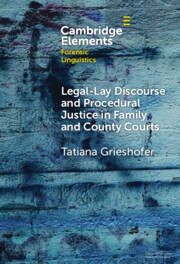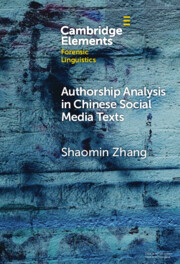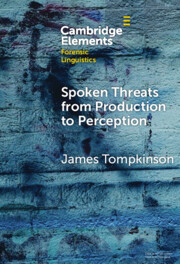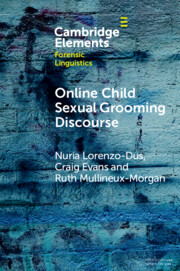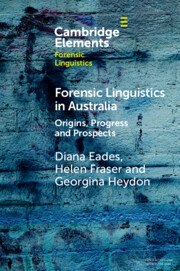About the series
Elements in Forensic Linguistics include 1) descriptive linguistics work, documenting a full range of legal and forensic texts and contexts; 2) empirical findings and methodological developments to enhance research, investigative advice, and evidence for courts; and 3) explorations and development of the theoretical and ethical foundations of research and practice in forensic linguistics.
Authors use their Element to fully explore an area of activity in forensic linguistics or language and law, or provide a synthesis of a number of empirical projects around a theme. Each Element allows authors space beyond the constraints of a typical journal article, but with a focus and sharpness that will carry a clear impact for readers.
Across these approaches, we publish in five main topic areas:
- Investigative and forensic text analysis;
- The study of spoken linguistic practices in legal contexts;
- The linguistic analysis of written legal texts;
- The interdisciplinary strand that is inclusive in our definition of forensic linguistics that will provide a platform for innovative research in related fields;
- Explorations of the origins, development and scope of the field in various countries and regions.
Elements in Forensic Linguistics provide high-quality accessible writing, bringing cutting-edge forensic linguistics to higher-level students and researchers as well as to practitioners in law enforcement and law.
As well as for students and researchers of linguistics and forensic linguistics, Elements will be accessible to and of interest to those working in the disciplines of law, criminology, sociology, and legal and forensic psychology. Elements will provide these audiences with full methodological descriptions, data sets, and coding schemas, where relevant.
Elements will also be relevant to practitioners in law and allied legal professions as well as across law enforcement, investigative, and security contexts. Elements will include applied and relevant examples that can inform and contribute to practitioners’ work in all fields.
Elements in this series
-
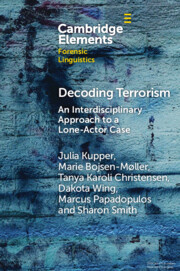
- Element
Decoding Terrorism
-
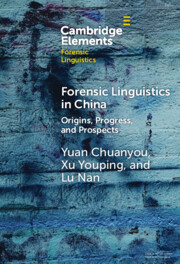
- Element
Forensic Linguistics in China
-
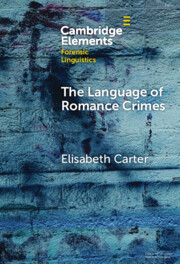
- Element
The Language of Romance Crimes
Series topics:
Investigative and forensic text analysis, will include but not be limited to research and validation studies on:
- authorship analysis, including comparative authorship analysis and sociolinguistic profiling;
- threat, abuse, harassment, and other forms of malicious communication;
- the determination of meaning of investigatory and evidential texts.
The study of spoken linguistic practices in legal contexts, will include but not be limited to research on:
- points of first contact between practitioners and lay-persons in legal contexts, including emergency call handlers, and communications of rights and legal liabilities;
- police interviews and interrogations, and other interviews and interactions providing evidence for legal decision making;
- courtroom interactions and judicial language and judgements.
The linguistic analysis of written legal texts, will include but not be limited to research on:
- the language of statutes and written judgements;
- the language of wills, contracts, and legal-lay documents;
- the processes of legal drafting;
- linguistic contributions to the interpretation of legal meanings in statutes, intellectual property, and other contractual agreements.
The interdisciplinary strand, will include but not be limited to research on:
- studies in forensic speech and audio science;
- studies in computational linguistics;
- studies in forensic psychology;
- studies with broader sociological and criminological concerns; which include linguistic methods or ideas, and which are deemed to be of interest to the broad discipline of forensic linguistics.
The 'Origins’ sub-series, will include but not be limited to descriptions of:
- the history of forensic linguistics and language and law in particular countries or regions;
- well-known or seminal cases that set the stage for the field;
- history and review of current law and legal practice of relevance to forensic linguistics;
- progress seen in various aspects of the field with predictions for the future.
Contact the editors
If you are interested in publishing for the series, please contact the editors Tim Grant t.d.grant@aston.ac.uk and Tammy Gales Tammy.A.Gales@hofstra.edu
About the editors
Tim Grant is Professor of Forensic Linguistics, Director of the Aston Institute for Forensic Linguistics, and past president of the International Association of Forensic Linguists. His recent publications have focused on online sexual abuse conversations including Language and Online Identities: The Undercover Policing of Internet Sexual Crime (with Nicci MacLeod, Cambridge, 2020).
Tim is one of the world’s most experienced forensic linguistic practitioners and his case work has involved the analysis of abusive and threatening communications in many different contexts including investigations into sexual assault, stalking, murder, and terrorism. He also makes regular media contributions including presenting police appeals such as for the BBC Crimewatch programme.
Tammy Gales is a Professor of Linguistics and the Director of Research at the Institute for Forensic Linguistics, Threat Assessment, and Strategic Analysis at Hofstra University, New York. She is the Vice President (and President-elect) of the International Association for Forensic and Legal Linguistics (IAFLL), and is on the editorial board for the peer-reviewed journals Applied Corpus Linguistics and Language and Law / Linguagem e Direito.
Her research interests cross the boundaries of forensic linguistics and language and the law, with a primary focus on threatening communications and the use of corpus linguistics in statutory interpretation. She has trained law enforcement agents from agencies across Canada and the U.S. and has applied her work to both criminal and civil cases.

